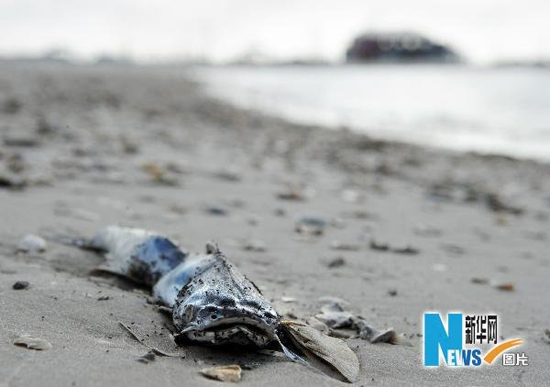Oil spill bad for world oil supplies and U.S. economy
The Gulf oil spill will likely kill the energy bills in the United States, reduce U.S. drillings, and increase imports of oil, which is bad for world oil supplies and U.S. economy, said a U.S. expert in Chicago on Friday.
|
|
The explosion and sinking of a BP Plc oil rig on April 20 and the subsequent massive oil spill has claimed 11 workers' lives and contaminated waters at the Gulf of Mexico with millions of gallons of oil.
Oil is still belching thousands of barrels into the water every day and has now reached the shores of Louisiana, impacting the livelihoods of millions in the Gulf Coast states and threatens more.
In an interview with Xinhua, Richard Wottrich, managing director, international at Dresner Partners and coordinator at Centercut, Alternative Energy & Sustainability, said:“The chief negative impact regarding the Gulf oil spill is political. President (Barack) Obama recently announced certain relaxed offshore oil drilling lease availabilities and certain natural gas expansion of drilling. These initiatives are probably politically dead now.”
“This means there will be no energy bill in the U.S. prior to the (mid-term) elections in November, when the balance of control in congress may very well change. Less U.S. drilling means more imports of oil, which is bad for world oil supplies and bad for the US economy. As the US economy grows, oil imports will increase and crude prices will increase,”he further explained.
When commenting on how serious the incident is, Wottrich, who has over 30 years experience in the financial services and extensive experience in energy industry, pointed out that "the Gulf spill itself is serious, but the long term harm will be unclear for some time."
"Hundreds of thousands of gallons of oil dispersant chemicals are being dumped into the Gulf to settle it under water before it hits shore ...Therefore relatively little oil has reached land so far and that is a positive. But the long term impact of these chemicals on the Gulf's bottom is not well understood,”he noted.
Wottrich suggested that it probably makes sense for major oil companies to demonstrate in tests that they can contain such spills at such great depths before they are granted leases and drill at such wells.
“The government should pass legislation to require this,”he said.
It should be recognized that crude oil seeps into the Gulf, and into other major bodies of water, as a natural occurrence. In the Gulf over a million gallons a year are naturally dispersed over a wide area. But when a great deal of oil is released in this manner in a concentrated area it is difficult to gather and remove it.
"The dispersant chemicals are just one weapon available to clean up the mess. I think that in general the effort being made is the best that could be expected under the circumstances," said Wottrich.
He urged the government to require the private companies or state-owned companies it allows to drill on its soil or in its waters to demonstrate the ability to respond to such oil spills and to have enough resources available to respond properly when such accidents occur.
“It makes sense for these companies to make payments into a special fund in advance of such accidents, so that the money is there when it is needed -- especially to compensate private citizens whose lives are disrupted by the spill,”he said.
It has been nearly three weeks since the Deepwater Horizon oil-drilling rig exploded in the Gulf of Mexico, killing 11 workers and causing 5,000 barrels of oil a day to leak into the gulf.
Currently, BP, the U.S. National Response Team, and an army of volunteers work together to respond to the incident in the Gulf of Mexico to stop the flow of oil and prevent further damage to the environment.
 0
0 







